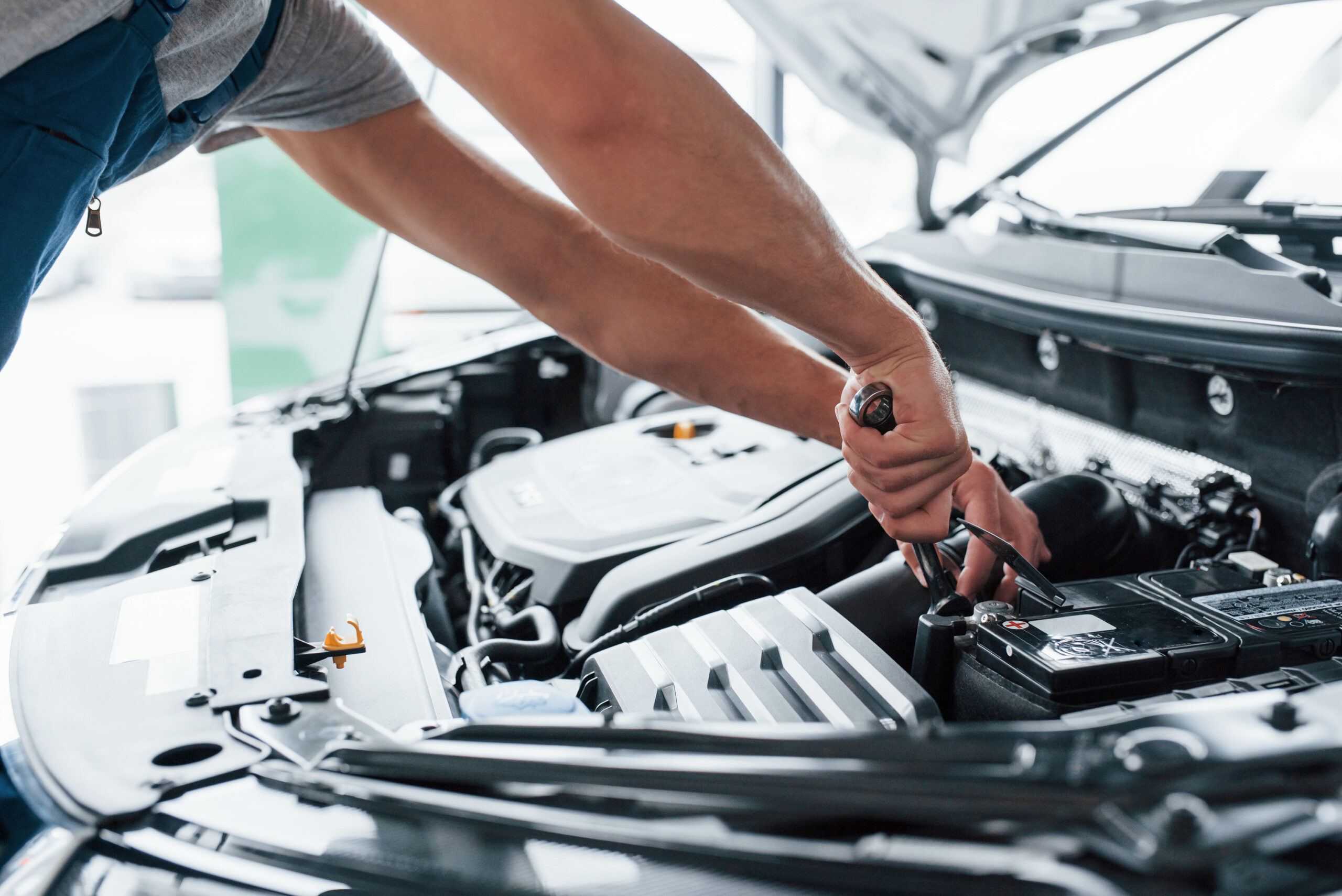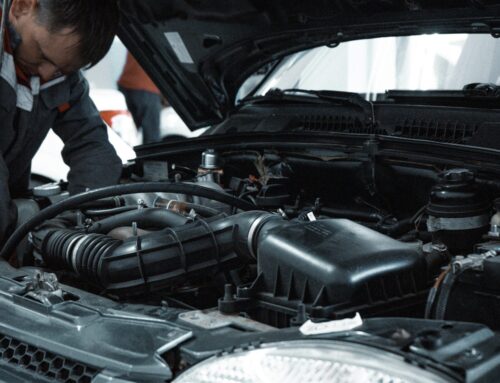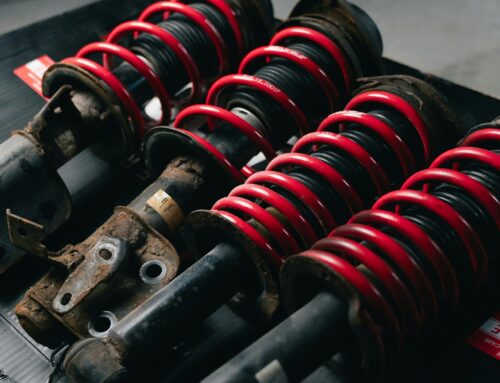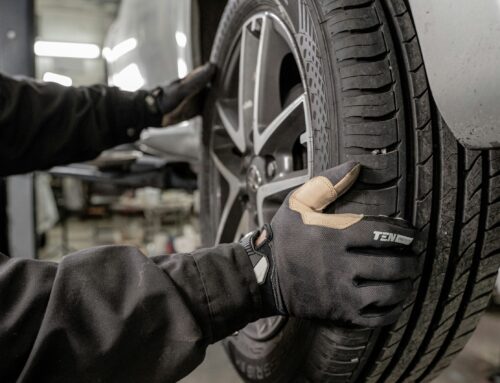It’s easy to turn up the volume and drown out the strange noises coming from your car, but ignoring them will cost you more than your peace of mind. Those noises are often early warning signs, and taking the necessary steps asap can save you from expensive repairs, unsafe driving conditions, or unexpected breakdowns on the road.
Whether you’re hearing a rattling noise when accelerating or a ticking noise from the engine, this guide breaks down 7 car sounds that you shouldn’t ignore, what they might mean, and what steps you can take to prevent further damage.
1. Knocking Noise While Driving
A knocking noise coming from inside your car, especially if it’s from the engine bay, typically signals an issue with how your engine is firing or lubricating itself.
Potential Causes:
- Low or Dirty Oil: Check if your engine has enough oil and if there are any leaks. Dirty oil will also prevent the oil from lubricating internal components properly, creating friction and causing a metallic knocking.
- Carbon Build-Up in Cylinder: Carbon can build up inside the combustion chamber, creating hot spots that ignite fuel too early and reduce fuel efficiency.
- Worn Engine Bearings: Bearings allow smooth motion between the engine’s components. When worn or damaged, it creates a deep knocking sound and requires immediate mechanical fixing.
What To Do:
If your car is making a knocking noise while driving, book a diagnostic service asap. Continuing to drive and ignoring can lead to serious engine damage and expensive repair costs.
2. Squealing Sound When Braking
If you start hearing high-pitch squeals every time you brake, it’s your brake system sounding the alarms. It’s a common warning noise that comes with high risks.
Potential Causes:
- Worn Brake Pads: Brake pads consist of an indicator that makes a squealing noise when the layers of the brake pad are worn out. It’s an indication that you’re due for a brake pad replacement.
- Debris Between Pads: Excessive dust or debris can get caught in the brakes, which causes that squealing noise when you’re braking. Doing a thorough inspection and scheduled cleaning will help with the issue.
- Lack of Lubrication: If your brakes lack lubrication, it can build up rust and cause that squealing noise. You’ll need to apply high-temperature brake lubricant to your brake pads.
What To Do:
Brake issues are one of the most concerning safety issues. You’ll need to book a brake service at your nearest mechanic ASAP before it compromises your passengers’ safety.
3. Clunking Noise When Turning
A clunking noise that comes from turning the wheel usually indicates an issue with either your car’s steering or suspension system.
Potential Causes:
- Damaged CV Joints: Constant Velocity (CV) joints enable your front wheels to turn. If they sustain damage, it’ll create a clunking noise when turning.
- Worn Ball Joints or Tie Rods: These joints help to steer and absorb road impacts. When they’re worn, it’ll make a clunking noise when you steer or drive over uneven surfaces.
- Loose Control Arms: Control arms link the wheel assembly to the car’s frame. If these become loose, it’ll affect the handling and limit the car’s steering abilities.
What To Do:
Steering and suspension faults can limit handling and wear out tyres. A basic inspection by an expert mechanic can prevent serious issues that you might not be able to identify by yourself.
4. Rattling Noise When Accelerating
A rattling noise when accelerating is often caused by loose or deteriorating components underneath the bonnet.
Potential Causes:
- Loose Heat Shields: Loose heat shields around the exhaust and catalytic converter might be caused by built-up rust. When accelerating, the loose parts might collide with each other, causing the rattling noise.
- Worn Engine or Transmission Mounts: The transmission mounts ensure that the engine and gearbox are in place. If these become damaged or worn, it’ll allow excess movement that creates the rattling effect.
- Failing Catalytic Converter: If the catalytic converter starts to break down, it’ll create a rattling noise and will eventually affect emission and power delivery.
What To Do:
Though this doesn’t sound as urgent as the other issues, it can easily build up to more severe problems. It’s always best to play it safe and book regular maintenance to prevent any serious concerns and costly repairs.
5. Loud Exhaust
If your car has become noisier than normal, your loud exhaust might be trying to give you a warning.
Potential Causes:
- Leaking Gasket or Cracked Exhaust: A leaked gasket or cracked exhaust releases gas early, which in turn creates loud popping sounds near the engine.
- Built-Up Rust: Corrosion from built-up rust can increase noise levels and possibly risk fumes entering your cabin, which can pose a serious health issue.
- Damaged Muffler: A corroded muffler can lead to a loud exhaust and stop its main job of keeping your engine quiet.
What To Do:
Other than the loud and distracting noise, a faulty exhaust also impacts the car’s overall performance, decreases fuel efficiency, and can potentially leak hazardous fumes into the cabin. Do not treat this issue lightly and act quickly to protect your health as well.
6. Grinding Noise From Gearbox
A grinding noise while shifting gears is never a good sign or sound that you want to hear. It usually redirects to a damaged transmission.
Potential Causes:
- Internal Gearbox Damage: The internal components, such as the bearings, shafts, or gears, can fail if you neglect to conduct consistent maintenance. It’ll lead to louder grinding noise and impact the car’s overall performance.
- Worn Clutch in Manual Transmissions: If your clutch is worn out, it’ll cause a grinding noise when shifting gears, and wear out your synchroniser and gears.
- Worn Synchroniser: Synchronisers are responsible for ensuring your gears work smoothly. Worn clutches can wear out the synchronisers and cause the gears to grind.
What To Do:
Transmission repairs might not come cheap, but early repairs are always the best choice to keep your car in top performance. Make sure you’re always planning ahead with regular maintenance with your mechanics, as prevention of any issues should always be the standard.
7. Ticking Sound In The Engine
A ticking noise from the engine can be easily overlooked compared to the other noises mentioned in this list, but it’s also a sign that your engine isn’t lubricated properly.
Potential Causes:
- Low Engine Oil Levels: Neglecting the oil levels prevents the oil from reaching top-end components like the filters and valves. These will cause the ticking sound from the friction and contact of the components.
- Damaged Fuel Injector: Loud or irregular ticking might indicate a faulty injector or poor fuel pressure.
- Incorrect Valve Clearance: A ticking noise is common in older vehicles or poorly maintained engines. It’s caused by an irregular gap between the valve and camshaft.
What To Do:
Engine ticking might only require an oil change, but as with other issues, it might be a sign of deeper issues if left unchecked.
Don’t Ignore The Noises & Get Them Checked With Ultra Tune
Don’t wait to get your car checked until it’s too late and when the damage is done. At Ultra Tune, we offer complete Car Maintenance services to inspect and repair any issues you might encounter, including brake checks, tyre inspections, damaged suspensions, and more.
Whether you’re hearing any strange noises or seeing noticeable differences when you drive, don’t wait to get it checked. Our qualified technicians can help you feel confident behind the wheel, whatever the issue.
Ready to prep your car for an inspection?
Proper car maintenance can prevent costly repairs, keep your car performing at its best, and, most importantly, ensure that you and your passengers are safe on the road. Use this guide as your checklist and turn to the experts at Ultra Tune for professional support.






